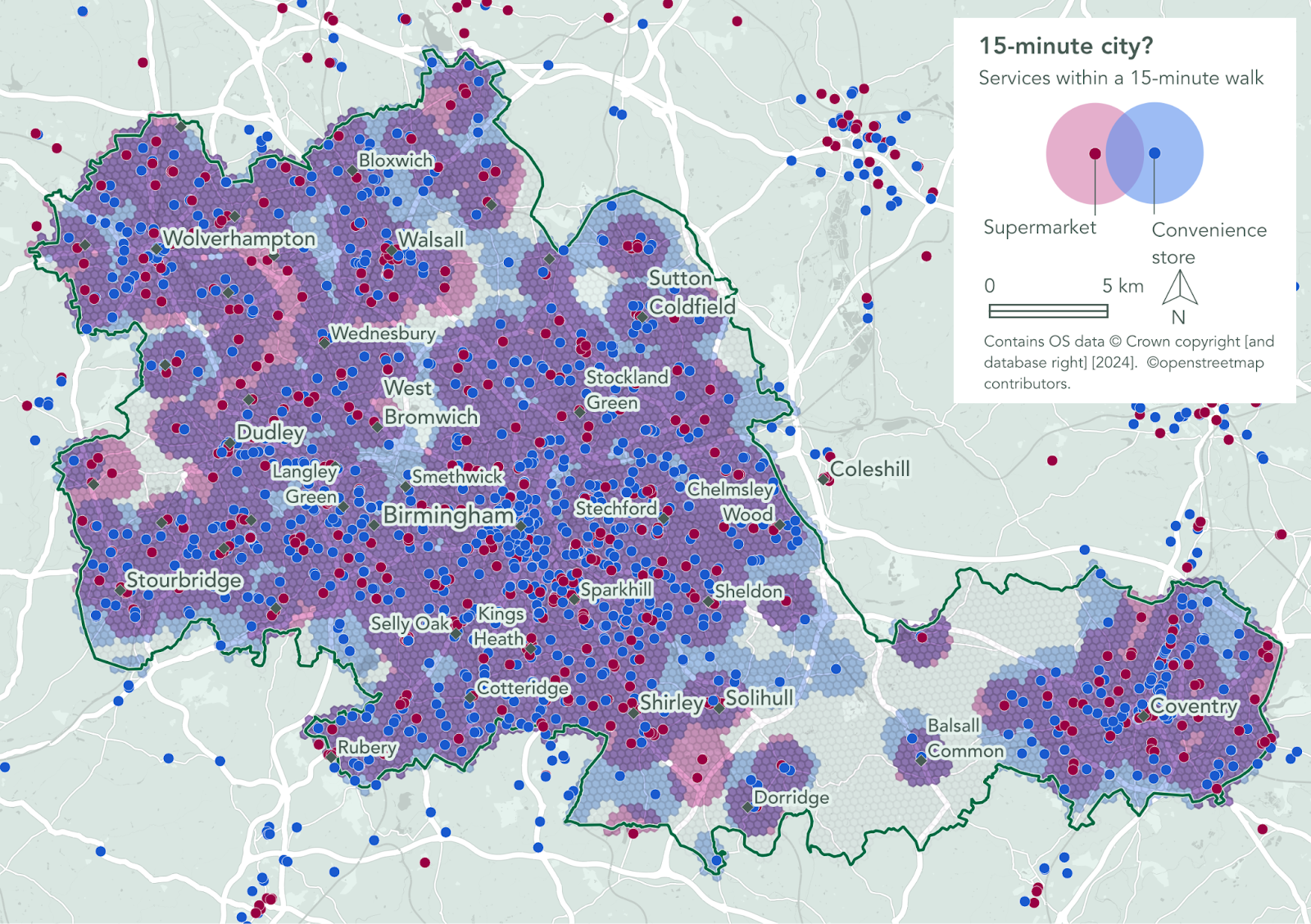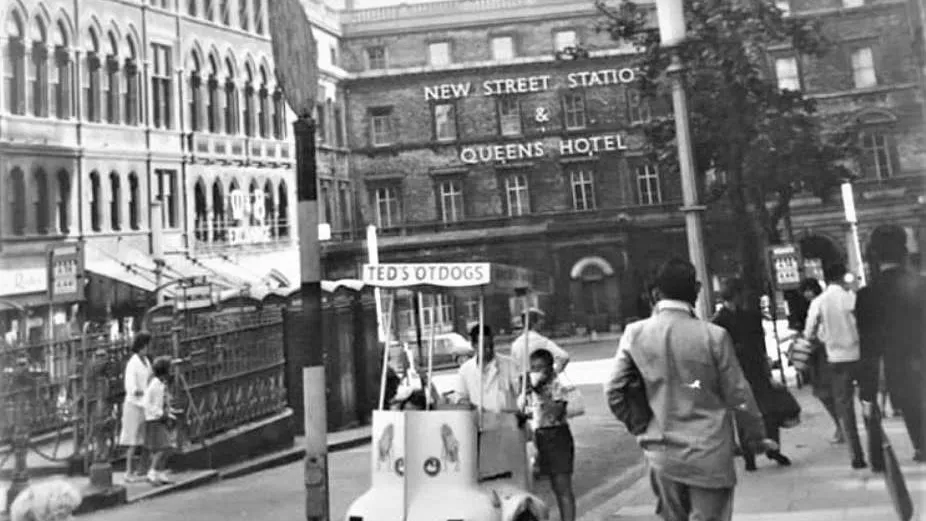Dear Patchers — how far away is your nearest food shop? Primary school? Park? If you’ve answered all of the above with “less than 15 minutes” and you’re not having to get behind the wheel to do it, then it’s just possible you live in a “15-minute city” — one where every amenity is within easy, car-free access.
The concept ballooned during the Covid lockdowns. For some, it was a promise of a local utopia, for others a sinister plot. Today we asked Helen McKenzie, an expert in Geographic Information Systems, to put her map-making skills to the test and find out where, exactly, in the West Midlands could be called a 15-minute city.
Brum in Brief
🗨️Blowback after Brum disturbances: While Kate reported on a largely peaceful gathering in Bordsley Green last night — in response to rumours of a race riot — many will have seen images and videos of young Muslim men attacking vehicles and a local pub, The Clumsy Swan. The police are investigating this incident, but the pub has made it known that elders from Muslim community, as well as the Sheldon Mosque, have reached out to the pub to offer to pay for damages.
Yardley MP and Safeguarding Minister Jess Phillips has faced criticism from James Cleverly for a post on X, in which she said: “These people came to this location because it has been spread that racists were coming to attack them.” Phillips added that anyone committing criminal acts should face the law but noted the misinformation about a rally would draw out crowds to create online content and drive further dissent.
Elsewhere, Perry Barr MP, the independent Ayoub Khan, went on Times Radio to talk about concerned residents in his constituency who have reached out to him about the far right. He added: “That [gathering on Monday evening] would have a natural reaction of many Muslims but also non-Muslims congregating around religious institutions in order to defend property and individuals and communities…its a form of solidarity but you will have fringes [too].”
🚓New police powers for Wolves: Police in Wolverhampton have been given new antisocial behaviour powers that give them the authority to order people to remove face coverings while also allowing them to break up groups of three or more people if they are causing a threat. However, councillors have raised concerns about these new policing abilities, which include worries that different people might have different definitions of what a perceived threat is and that the powers are vague. Regardless, the powers are now in place within the city ring road for the next three years. Full story.
😓Rotunda closure: An apartment-hotel business has closed in The Rotunda. Staying Cool at the Rotunda had been open for 15 years but the business cited a dip in demand and the pandemic as factors that had hit their model. “We love you Birmingham and we’re devastated to be saying goodbye like this," a statement said. More here.
🥘Digbeth Dining Club on tour: The award-winning Digbeth Dining Club is about to start a Midlands tour which will give foodies from Warwick to Sutton Coldfield a chance to indulge in the offerings of circa 110 traders. It kicks off in The Rugby Club in Sutton on 10 August and finishes on 27 September in Warwick Castle. Full details at a click — but pretty much guaranteed to hit a location near to you.
The West Midlands & 15-minute cities
By Helen McKenzie
What do you feel when I say “15-minute cities”? A warm glow, as you imagine an easy life popping to bakeries and cafés on a thriving local high street? Blank terror, as you picture Orwellian state control of your every movement? Or simply incomprehension?
The idea was first developed by Professor Carlos Moreno. It’s a simple concept: that within our cities people should be able to access all of their essential needs — food, education, healthcare, employment etc — within a 15-minute walk or cycle. No more long commutes stuck in endless traffic! No more driving to bleak retail parks! It was a manifesto for liberation. Though Moreno put it forward in 2015, every idea needs its moment, and when the Covid-19 lockdown began, interest in it surged. As everyone started spending all of their time in their local areas, traffic levels declined and people started to realise just how nice it could be to live a more local lifestyle. Many began to wonder: shouldn’t it always be like this?
But lockdown did strange things to how people saw the world, and for some, 15-minute cities became a cover for a much more sinister plot. It wasn’t that you’d be able to get everything within 15 minutes, if you wished. You would only be able to travel within 15 minutes, as local authorities used insidious means to pen people in. Extraordinarily, this was given credence by now former Transport Secretary Mark Harper, who told the 2023 Conservative Party conference: “What is sinister and what we shouldn't tolerate is the idea that local councils can decide how often you go to the shops and that they ration who uses the roads and when, and they police it all with CCTV.” The question of how local authorities — many of whom, like Birmingham, are going to the wall — could remotely afford to maintain this control (when they can’t even staff social care properly) was never answered.
But let’s return to the utopian ideal of convenience, thriving local communities and sustainable travel. With commuting times through the roof, school catchments and over 1.2 million people across the UK living in a “food desert,” just how close are we to being able to realise this concept? Are there already places, here in the West Midlands, which match the 15-minute city ideal?
The concept is a bit woolly. To answer that question we’re going to need some hard definitions and hard data. Time to make some maps.
Defining a 15-minute city
First, we need to know what we want to access within 15 minutes. I’ll define the essential required facilities as:
- Food stores: residents should have access to both 1) a large supermarket, offering choice and economy, and 2) a convenience store offering round-the-clock necessities.
- Education: both 3) primary and 4) secondary education.
- Healthcare: both 5) a GP and 6) a pharmacy.
- 7) Greenspace: according to Natural England, all residents should have access to greenspace of at least 10ha within a 15-minute walk.
- Transport: both 8) local (i.e. a bus) and 9) regional/national (trains, trams and metro services) transport should be available.
This gives us nine essential facilities. A neighbourhood with all nine will be considered a true 15-minute city.
But hang on, what about the pubs, the gyms, the places of worship? Well, yes. You’ve just poked a huge hole in the 15-minute cities model. What is classed as an essential facility for you and I may differ hugely depending on family, religion and lifestyle. For this exercise, we’re limiting our analysis to the facilities virtually all people need.
We’ll also limit our research just to a walking time of 15-minutes (which averages around 1,200 metres). While cycling is part of the original 15-minute city model, last year in the UK only 7.4 million — or 10% — of the UK population undertook any cycling. And we’ll focus on the area covered by the West Midlands Combined Authority: Birmingham, Coventry, Dudley, Sandwell, Solihull, Walsall, and Wolverhampton local authorities. We’ll build up a picture by taking each essential facility in turn, showing us at the end where the true 15-minute cities are.
Food stores

On the map above, the blue dots are convenience stores, with the blue shaded areas around them the areas within 15 minutes walk of them. Similarly, supermarkets are red dots, with red shaded areas around them. As you can see, food stores get pretty good coverage across the region, with the exception of the rural corridor between the Birmingham conurbation and Coventry. In general—and as you would expect—convenience stores have a wider coverage than larger supermarkets.
Schools
Birmingham deserves great journalism. You can help make it happen.
You're halfway there, the rest of the story is behind this paywall. Join the Dispatch for full access to local news that matters, just £8/month.
SubscribeAlready have an account? Sign In







